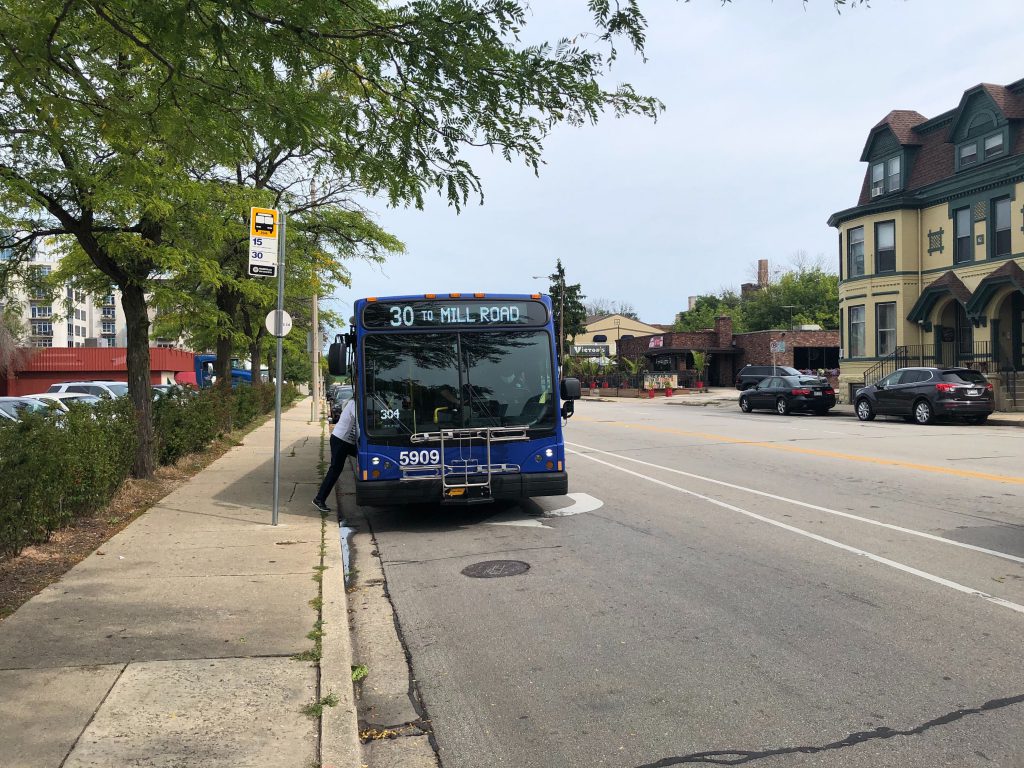Transit Union, MCTS Reach Agreement
New three-year labor contract hailed by both management and bus drivers union as fair deal.
The Milwaukee County Transit System (MCTS) and the union representing transit workers have finalized a new three-year labor contract after more than seven months of negotiations.
“We believe the contract itself is a good contract,” said Donnell Shorter, president of the Amalgamated Transit Union Local 998 (ATU). “It’s not a perfect contract.”
The negotiations since then largely turned on two major issues: wages and healthcare costs. But there were also a number of small policy changes in the final contract that Shorter said the union had been trying to secure.
On wages, MCTS offered a larger wage increase that added up to 11% over the life of the contract. Shorter said the wage increase brings Milwaukee County transit workers closer to the average wage increase that ATU members around the country typically see. “We were trying to get a wage that was competitive in the transportation industry,” he said.
“A contract that’s well bartered from both sides is gonna hurt a little bit on both sides,” Shorter said.
Healthcare costs was one of the main issues that drove some members to vote no on the contract, Shorter said. That and a concession the union made on part-time operators.
The new contract includes an agreement to allow the company to use part-time bus operators on Saturdays and Sundays during the first year of the contract. After that, the union and MCTS have to agree to continue the policy moving forward.
MCTS is currently offering $1,000 sign-on bonuses for new drivers, and has for some time. But it continues to struggle with employee retention. The transit system has hired hundreds of new operators in recent years, but has not reached full strength as the company loses drivers almost as fast as they hire new ones.
The union repeatedly told the press and local elected officials that they saw this contract as pivotal to the future of MCTS, given the retention problems have led to service being discontinued and forced the transit system to spend millions training new drivers because they can’t keep the ones they already have.
The new contract included two policy changes that should improve the work-life balance for operators, Shorter said.
The first is a reduction in the length of time the company can hold workers after their eight-hour shift is completed. The company used to be able to hold workers for 10 hours of mandatory overtime; now it can only hold them for six. “Eighteen hours, that’s more than a double shift,” Shorter said of the old overtime policy.
In a statement, MCTS Interim Managing Director Denise Wandke said, “I think this contract shows our commitment to our employees and desire to collaborate with the union. I am proud of each and every employee and their amazing contributions to this community.”
County Executive David Crowley said, “On behalf of all Milwaukee County residents, I commend the Milwaukee County Transit System and the Amalgamated Transit Union Local 998 for reaching a fair and equitable agreement that results in uninterrupted transit service for all residents. The transit system is an integral part of our community and I’m proud to stand in support of both MCTS and the ATU, as we continue serving passengers across all of Milwaukee County.”
Union Wants to Partner With County In Fight for State Aid
Declining ridership, a trend that worsened during the pandemic, has put a huge hole in the transit system’s budget. MCTS has been using federal stimulus funds to balance its budget and now faces an estimated $20 million budget shortfall in 2025 when those funds run out. The financial problem is driving by a decline in state shared revenue to the county.
The union president said he has seen first hand how much easier it is to “get things done” while assisting other ATU properties with contract negotiations in other communities when the funding is there.
“We’re extending that olive branch to do what we can to help solve that shared revenue,” Shorter said. “But I’m also going to let them know, in 24 months, we’re going to be negotiating again.”
Whether shared revenue is the problem or not, Shorter sad, “We can’t keep writing a charity check from our paycheck.”
Political Contributions Tracker
Displaying political contributions between people mentioned in this story. Learn more.
Transportation
-
MCTS Adds 28 New Buses
 Jul 13th, 2024 by Graham Kilmer
Jul 13th, 2024 by Graham Kilmer
-
MCTS Designing New Bus Shelters
 Jul 10th, 2024 by Graham Kilmer
Jul 10th, 2024 by Graham Kilmer
-
MCTS Updates RNC Bus Detours To Better Serve Downtown, Riders
 Jul 9th, 2024 by Jeramey Jannene
Jul 9th, 2024 by Jeramey Jannene






















